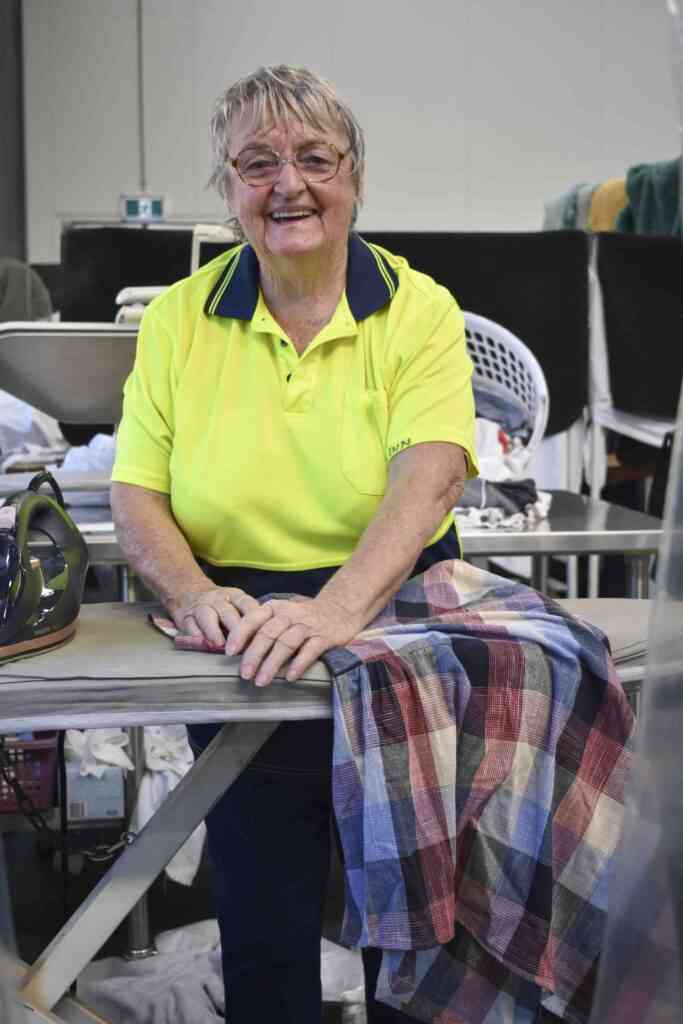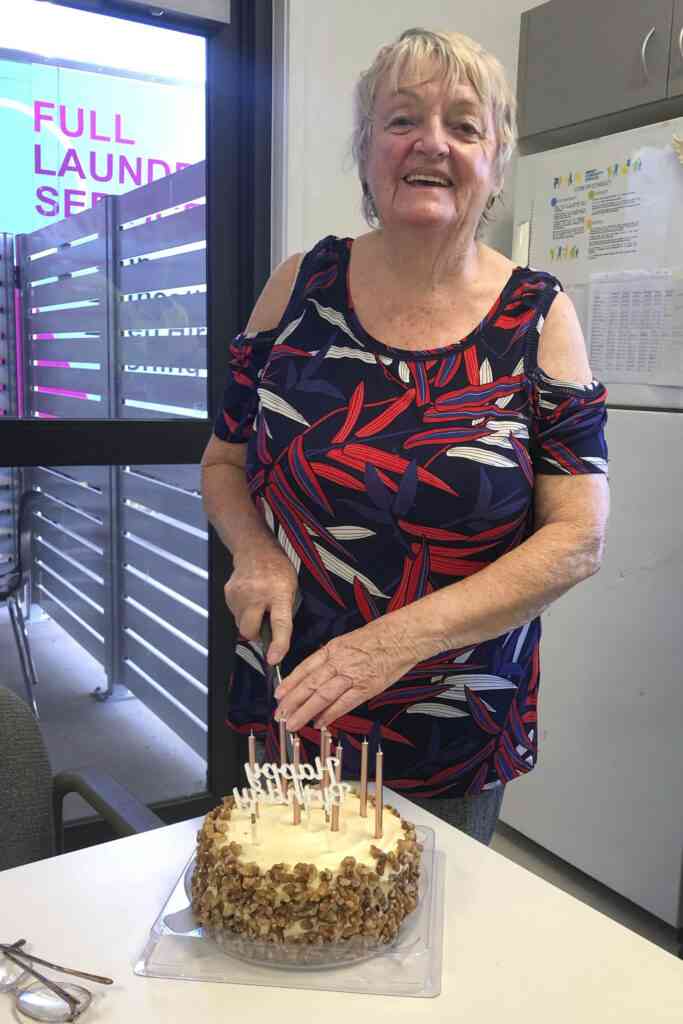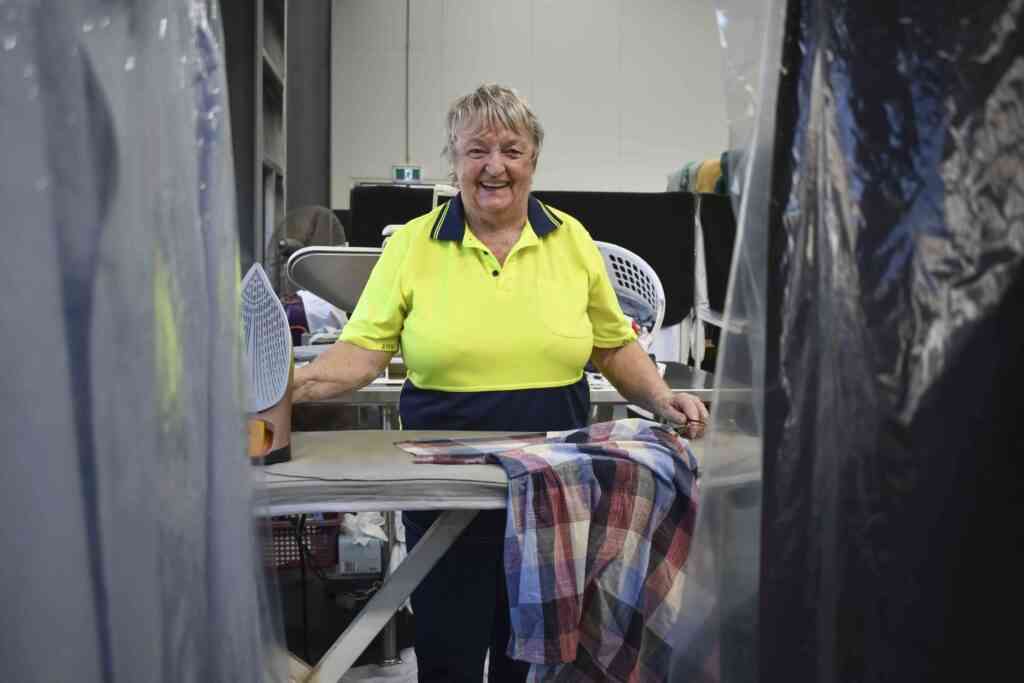- Home
- Stronger Together
- Support & Wellbeing
- Disability & NDIS
- Mental Health
- Families & Parenting
- Support for Individuals
- Community Health
- Employment & Training
- About Us
- About us
- Get Involved
- Governance
- Social Enterprises
More than 200kg of laundry just became light work at NEW iMAGE Laundry.
The commercial laundry is an initiative of IMPACT Community Services’ which serves Bundaberg and the surrounding areas.
IMPACT’s Laundry manager Daniel Leary said they recently installed two Jensen Washer Extractor 110kg machines.
These Front Loader single pocket machines will essentially double the capacity of the laundry.
“The current wash capacity at the Laundry was 180kg at any given time, with the average cycle being around 45 minutes,” he said.
“The current machines are 40kg, 60kg and 80kg. Meaning that it would take three machines to produce 180kg every 45 minutes.
“These 2 new machines are each 110kg which allows us to process an additional 220kg every 45 minutes.”
Daniel said this equated to a new capacity of 400kgs every 45 minutes.
He said without the new machines the laundry was operating at close to its maximum capacity and this made it difficult to pursue other contracts to drive production and sustainability further.
The new equipment allows the laundry to fine tune its operation, reduce overheads. It now also allows us to drop existing machine out of production for essential maintenance at given times while still maintaining good production levels.
Servicing a range of local aged care facilities, hospitals, medical practices, accommodation outlets and more, the laundry is committed to working to meet all guidelines set by the Australian Standards AS/NZS 4146.2000 for the collection, loading, storage and sorting, disinfecting, washing and delivery of linen.
Daniel said key aspects to commercial washing operations and remaining compliant to medical and aged care standards are Mechanical, Thermal and Chemical disinfection.
The Mechanical Action is achieved by the engineering of the inner drum and the rigorous tumbling process. The Thermal action is achieved by the injection of steam continually throughout the wash cycle to maintain set temperatures. And the Chemical disinfection is maintained by the computer-controlled injection system which delivers concentrated wash, softening and neutralising chemicals.
Daniel said the washing machines operate up to 80 degrees Celsius depending on the fabrics being processed, while the ironer operates at 180 degrees Celsius and the dryers at 90 degrees Celsius. This will eliminate any pathogens or viruses that may have been in contact with the linen.
The machinery and wash cycles are calibrated each month to ensure that all the above measures are being meet. Importantly, the linen is also pH tested to confirm neutral pH linen was going back to clients. This is particularly important for use in hospitals and aged care facilities were when patients and residents will have contact with linen for prolonged periods.
The machinery was commissioned on June 8, 2022.
Current research suggests that the covid virus cannot withstand temperatures at or above 70°C (158°F). All medical, aged care and accommodation linen at NEW iMAGE Laundry is washed at between 75 and 80 degrees Celsius.
When washing clothes for Bed Bugs or lice, wash cycles above 65 degrees for 10 minutes killed 100% of all life stages. Washing at 40 degrees killed all adults and nymphs, but only 25% of eggs. Therefore, washing clothes for bed bug dis-infestation should be done at the hottest temperatures. Most domestic washing machines will not maintain these temperatures for any period to eliminate these pests.
The extraction process of moisture or final spin cycle by our washing machines is done at 350 G-forces. In comparison, the massive G forces experienced by a space shuttle astronaut at take-off is 3 G, while fighter pilots can only manage up to about 9G for a second or two in a vertical manoeuvre.
NEW iMAGE Laundry is located at 4 Inglis Court, Svensson Heights, and is open 5 days a week from 8am to 3pm.
Want to know how our commercial laundering could benefit your business, visit webpage or call us on (07) 4152 6158.
By Tanya O'Shea, IMPACT Community Services' Managing Director
"STRONGER TOGETHER" is a weekly column where Tanya explores key issues. This weeks Tanya focuses on what older workers bring to the workforce.
At IMPACT Community Services, we pride ourselves on our commitment to fostering a culture of diversity and inclusion. Our values include a focus on celebrating uniqueness, creating a place built on dignity and respect that applauds individuality and where everyone is welcome.
We create regular opportunities to have deliberate conversations about diversity and inclusion and what it means for our organisation. We aim to dig deep, engaging in thought-provoking discussions that challenge our personal beliefs, values and worldviews, in addition to unearthing our unconscious bias.
Unconscious biases are our thought patterns, our mental shortcuts that we create over a lifetime.
Imagine walking into an unlit car park at night in the rain and seeing a stranger approaching in a raincoat and hoodie. We immediately make a snap judgement about that person. We question whether we can trust them, and our body fills with adrenaline as we sense danger and prepare for our flight, fight or freeze response.
These things happen automatically.

Remember when you first learnt to ride a bike or drive a car. You needed to think through every step logically until learning this new skill became automatic. Once you learn the skill, you can do a complex activity like driving a car without consciously thinking about it.
In a similar way, our unconscious biases support us to navigate a complex social world. The only problem is that these biases can have negative effects. We make snap judgements about others all the time: when we see a figure walking towards us on a dark, rainy night; a person that we pass on the street; the people we work with; a person that we interview for a job.
We construct stereotypes that have been developed over time to make judgements about people every day. These stereotypes can be built from direct personal experience, from other people or via the media. And they can result in many forms of discrimination – too many for us to focus on in one article.
I would however like to touch briefly on age discrimination.
Before sharing a personal story, it is important to note that ageism is not just an issue for older people. It can affect people of any age. However, when directed towards older people, it comes from negative attitudes and beliefs about what it means to be older.
After turning 50 a few months ago, I reflected on a podcast where a woman was lamenting about not being taken seriously at her workplace and remarked “On top of all that, no one in the world sees me anymore because I’m an older woman.”
Whilst her comment was said in jest, the reality is that she was only half joking. Research suggests that it is not uncommon for people over the age of 45 to experience ageism, described by some as a feeling of being invisible.
And then it happened to me.
Standing at the bar of our quiet local sports club, the young man served the person to the right of me and then went to serve the person to the left – even though I had been standing there in his full view for the entire time.
It is easy to fob this off as an extraordinary, once off, unusual event. Yet, the reality for many over the age of 45, is that this feeling of being ‘invisible’ is age discrimination, and for some, it is not a one-off experience.
And like any form of discrimination, it is unacceptable.
At IMPACT, we have many dedicated, valuable staff working beyond the age of 65: Gwyn Bishop, Tony Cartledge and Ann Duffy, who at the age of 78, informally mentors younger workers at IMPACT’s New Image Laundry.
Each of these incredible people brings a specific skillset that would have been lost if not harnessed to help shape IMPACT’s culture, in addition to supporting us to achieve our vision of Improving Lives.
Age inclusivity makes common sense: cognitive diversity, variety of skills and talents, and a depth of personal experiences to draw from. According to social commentator Jane Caro, “When you discriminate against age you are shooting yourself in the foot. Every older person wants to be taken seriously and treated as an individual.”
Being inclusive of people of all ages is something that we can all do better.
Take notice the next time that you are not valuing someone who is a different in age to yourself.
Be curious and challenge any biases that come up for you.
Ask yourself, ‘What can I learn from this person that will make me a better human being?’

Most people in their 70s have said goodbye to their working years, are enjoying retirement and might even set off travelling to different parts of the country when possible.
But retirement couldn’t be further from Ann Duffy’s sights, with the New Image Laundry worker recently celebrating her 78th birthday with her colleagues.
Despite making numerous offers to resign, Ann continues to turn up for work each day.
Why?
“I just love ironing,” Ann laughed.
Ann began working at the laundry 16 years ago when it was called Peg and Iron, located at Bundaberg East, and remained on-staff when IMPACT took the business over in 2013.
“When IMPACT first bought the laundry, I offered to resign, but they wouldn’t let me,” she joked.
“Then when they moved to this big building (at 4 Inglis Court) I offered to resign again, but they look after me so well.”
After many years of work, Ann said the key to staying with the laundry was her relationship with the staff.
“I class the staff here as family,” she said.
Before the laundry became the busy commercial operation it is today, Ann used to pride herself on being the laundry counsellor and would take the time to talk through any issues the younger workers had.
“When you get to my age, you’ve been through it all,” she said.
“Now we’re too busy for that, and IMPACT offers its own counsellors for staff... but they all know I’m here as a listening ear if they need.”
Ann has worked her way through each role of the laundering process, from doing the washing and folding towels and pillow slips to using the big machines, but has given up the heavy work for a more modest job of ironing garments.
To celebrate her birthday the whole laundry came to a standstill and celebrated with a morning tea.
“I’m so blessed really, and I say that a lot, because there are people at my age and even younger who aren’t working,” she said.
Ann said New Image Laundry was a great place for people with a health concern to gain employment because IMPACT understood that different people have different abilities.
“If they come here, they’re not going to get pushed to do the top work,” she said.
“If they can come and do the best they can, that’s what IMPACT seems to accept.”
And it’s not just the laundry Ann is involved in.
“If you want to be sociable with IMPACT, I’m even in their ability choir,” she said.
“We do look after disability people here… and everyone is accepted.
“IMPACT does a lot for the community, and not just in the disability space but in supporting the whole community in so many ways.”
To find out more about the many services offered at IMPACT, visit www.impact.org.au.
